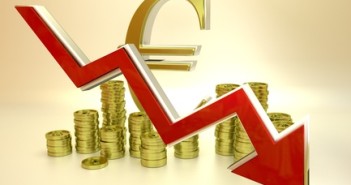Is the EUR/USD divergence trade back? We’ll know soon enough. Here is a preview from Bank of America Merrill Lynch on the prospects for the world’s most popular currency pair and the upcoming ECB meeting.
Here is their view, courtesy of eFXnews:
We do not expect any ECB action at this week’s policy meeting. After the big package in March, we think the ECB will have a few months before it needs to go back to the drawing board. True, dovish Fed tones and EUR appreciation do not help the ECB at the moment, but action beyond a reiteration of forward guidance seems very unlikely this week.
That said, Draghi could provide some more insights on governing council considerations on a number of aspects including (1)the US outlook and implications for Fed and ECB policy divergence; (2) the type of shock that could prompt a reconsideration of deposit rate cuts (with doubts transpiring on the FX transmission of this tool, we see appetite very low); (3) tentative quantification of QE effects on growth and inflation; and (4) the need for inflation overshooting, which Draghi started to allude to in recent press conference Q&A sessions.
In Prepare to fight the central banks we argued that markets have stopped focusing on what central banks are doing and are positioning for what they believe central banks may or may not do. Indeed, five G10 central banks have surprised markets with easing this year – BoJ, ECB, RBNZ, Riksbank and Norges Bank – but their currencies are stronger and, with the exception of New Zealand, their equities weaker.
In the case of the ECB, investors took Draghi’s statement during the March press conference that there would be no more deposit rate cuts as evidence that the ECB was reaching its limits, despite the ECB commitment to do more QE instead. The ECB minutes actually suggested that the depo rate had not reached the floor, but the damage had been done. A number of ECB officials have attempted damage control since then, without success. Indeed, not only is the Euro stronger after the March ECB meeting, but inflation expectations are back where they started. Yellen’s very dovish comments, twice, during March also did not help.
Looking at the market reaction, it is as if the March ECB meeting never took place, despite the ECB having done more than the consensus had expected. In this context, we would expect Draghi to defend the ECB in the coming meeting and explain why the March measures reflect substantial policy easing. He could also remind markets that QE is open-ended and will not stop as long as the ECB is missing its inflation target. He is also likely to clarify that another depo rate cut remains available, if they need it.
Such comments could reinforce Euro weak trend. However, we do not expect the ECB to have a sustained EUR impact at this point and we will continue to trade the EUR/USD range.
We believe that we are far from additional ECB policy easing, after just having eased, suggesting that the ECB cannot commit to any action in this meeting that could weaken the Euro.
More sustained EUR weakness would require a critical mass of strong US data, particularly inflation, and stable global markets, in our view, allowing the Fed to sound more confident. The risk rally and better US data since the end of February suggest to us that we may not be far, but it could still take one or two more FMOC meetings.
We continue forecasting EUR/USD at parity by the end of 2016, expecting two Fed hikes, while the ECB continues easing.
For lots more FX trades from major banks, sign up to eFXplus
By signing up to eFXplus via the link above, you are directly supporting Forex Crunch.
